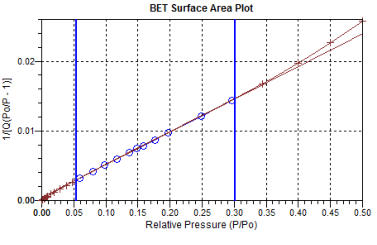




Expertise in the Physical
Characterisation of Materials

MCA Services
Unit 1A Long Barn, North End, Meldreth, Cambridgeshire SG8 6NT UK
01763 262333
© MCA Services




BET Surface Area by Nitrogen and Krypton Adsorption
The surface area of a material will often profoundly effect its behaviour and performance, whatever its application, and will commonly be a
critical parameter to consider when preparing or procuring a material. For example, surface area can be used to directly determine factors
such as reactivity, adsorption capacity, dissolution rate, electrochemical performance and burning / sintering ability. Knowledge and control
of surface area is often crucial at all stages of formulation, manufacture and ongoing QC processes.
Surface area, also termed Specific Surface Area (SSA), is most commonly measured by the BET (Brunauer-Emmett-Teller) method through
the gas adsorption technique. For the majority of samples nitrogen adsorption is used, but for very low surface area materials a krypton
adsorption option is also available.
Key Information
•
Surface area is a critical parameter for formulation, production and
performance.
•
Surface area often affects material performance
•
Surface area is often critical to material selection
•
BET Surface Area by Nitrogen adsorption
•
BET Surface area by Krypton adsorption for low area materials
•
Comprehensive degassing options available to suit specific requirements
•
Volumetric technique using state-of-the-art Micromeritics TriStar II 3020
•
Single point and multipoint measurement options available
•
Flowing gas method available where required
•
Argon adsorption option available
•
Carbon dioxide and oxygen adsorption options available
Sample
degassing
and
drying
immediately
prior
to
analysis
is
critical
to
ensure
that
samples
are
clean
and
dry.
This
is
undertaken
by
MCA
and
a
range
of
options
are
available,
including
vacuum
and
flowing
gas
techniques
at
temperatures
from
ambient
to
400
°C
are
available
to
ensure that samples are fully degassed without thermal degradation.
Nitrogen
adsorption
is
applicable
to
the
majority
of
sample
types.
However,
as
surface
area
becomes
particularly
low
nitrogen
fails
to
provide
accurate
data
from
which
to
calculate
surface
area.
In
such
cases
a
krypton
adsorption
option
is
also
offered
which
is
capable
of
measuring the geometric area of essentially non-porous materials.
Analyses
are
usually
undertaken
using
the
most
recent
Micromeritics
TriStar
3020
instrument,
offering
a
multipoint
volumetric
technique.
However,
a
flowing
gas
technique
and
single
point
measurement
options
are
also
available
which
provide
options
to
match
historical
methods and data.






Expertise in the Physical
Characterisation of Materials
MCA Services
Unit 1A Long Barn, North End,
Meldreth, Cambridgeshire SG8 6NT UK
01763 262333
© MCA Services




BET Surface Area by Nitrogen and Krypton Adsorption
The
surface
area
of
a
material
will
often
profoundly
effect
its
behaviour
and
performance,
whatever
its
application,
and
will
commonly
be
a
critical
parameter
to
consider
when
preparing
or
procuring
a
material.
For
example,
surface
area
can
be
used
to
directly
determine
factors
such
as
reactivity,
adsorption
capacity,
dissolution
rate,
electrochemical
performance
and
burning
/
sintering
ability.
Knowledge
and
control
of
surface
area
is
often
crucial
at
all
stages of formulation, manufacture and ongoing QC processes.
Surface
area,
also
termed
Specific
Surface
Area
(SSA),
is
most
commonly
measured
by
the
BET
(Brunauer-Emmett-Teller)
method
through
the
gas
adsorption
technique.
For
the
majority
of
samples
nitrogen
adsorption
is
used,
but
for
very
low
surface
area
materials
a
krypton adsorption option is also available.
Key Information
•
Surface area is a critical parameter for formulation, production
and performance
•
Surface area often affects material performance
•
Surface area is often critical to material selection
•
BET Surface Area by Nitrogen adsorption
•
BET Surface area by Krypton adsorption for low area materials
•
Comprehensive degassing options available to suit specific
requirements
•
Volumetric technique using state-of-the-art Micromeritics TriStar
II 3020
•
Single point and multipoint measurement options available
•
Flowing gas method available where required
•
Argon and Oxygen adsorption options available
•
Carbon dioxide adsorption available
Sample degassing and drying immediately prior to analysis is critical
to ensure that samples are clean and dry. This is undertaken by MCA
and a range of options are available, including vacuum and flowing
gas techniques at temperatures from ambient to 400 °C re available
to ensure that samples are fully degassed without thermal
degradation.
Nitrogen adsorption is applicable to the majority of sample types.
However, as surface area becomes particularly low nitrogen fails to
provide accurate data from which to calculate surface area. In such
cases a krypton adsorption option is also offered which is capable of
measuring the geometric area of essentially non-porous materials.
Analyses are usually undertaken using the most recent Micromeritics
TriStar 3020 instrument, offering a multipoint volumetric technique.
However, a flowing gas technique and single point measurement
options are also available which provide options to match historical
methods and data.



01763262333





















